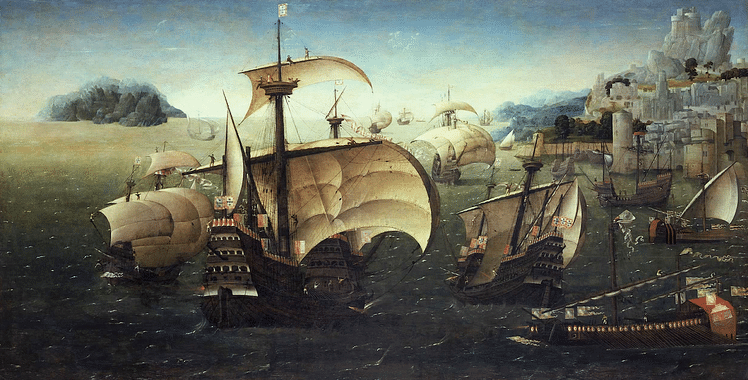
The Malacca Straits: A Gateway to Global Trade in the Early 16th Century
The Straits of Malacca have long been one of the world’s most strategic maritime passages, linking the Indian Ocean to the Southeast Asian region and facilitating trade between East and West as far back as 500 BC. In the early 16th century, this narrow waterway was already a bustling hub of commerce, diplomacy, and cultural exchange, as described by Portuguese explorer Duarte Barbosa in his early accounts. His writings, documented in The Book of Duarte Barbosa (Vol. II), offer a rare window into the vibrant economic and political activity surrounding the Straits during a pivotal moment in world history.
The Straits as a Nexus of Trade and Culture
During the early 1500s, the Malacca Straits served as the main artery for maritime trade between India, Southeast Asia, and China. Barbosa’s observations provide a detailed look into how goods moved through this critical region, forming an intricate web of economic relationships that been formed via political loyalties, business arrangements and marriages. Ships loaded with spices, silks, and other luxury goods passed through the Malacca Straits, very much similar to the situation of today.
Describing traders from as far afield as Gujarat, Persia, Arabia, China, and Java. This cosmopolitan environment fostered cultural exchanges that would shape the development of the region for centuries. His account highlights how the Straits were not just a passage for commodities but also a conduit for ideas, religion, and customs. An oddity for a time before modern globalization.
The Political Landscape of the Malacca Sultanate
In the early 16th century, the Malacca Sultanate held sway over the Straits reaching it's peak between 1459 - 1477. Barbosa's descriptions provide rich insights into how the Sultanate managed its position as the gatekeeper of this crucial trade route.
The Sultan of Malacca maintained strong diplomatic ties with regional powers and foreign traders, ensuring that Malacca thrived as a trading port.
"Conquest of Malacca would not necessarily mean direct expansion of territory, but rather the acquisition of strategic control over Coastal Outposts, Rival Ports, and Centers of Production in order to reap as much profit as possible from the Seaborne trade"*There were strong emphasizes on the Sultan’s ability to navigate the complex political dynamics of the region, balancing relations with powerful neighbors while maintaining control over one of the world’s most important waterways.
Taxes and duties on foreign vessels passing through the Straits contributed to the Sultan’s wealth, while a well-organized system of protection for ships ensured that Malacca remained an attractive and secure destination for traders.

The Role of the Straits in the Global Spice Trade
The spice trade was the driving force behind much of the maritime activity in the Malacca Straits, and Barbosa’s observations provide a snapshot of this early global economy. Spices such as pepper, cloves, nutmeg, and cinnamon were in high demand across Europe and the Middle East, often valued as highly as gold. Mainly for it's unique ability to preserve food for extended periods of time before modern refrigeration.By the early 1500s, Europe was importing an estimated 2,000 tons of pepper annually, with much of it passing through the Straits. The prices of spices were heavily marked up, sometimes 40 to 60 times their original cost by the time they reached European markets.
The Malacca Sultanate capitalized on its strategic position, collecting spices from the Indonesian archipelago and distributing them across Asia and Europe. Barbosa’s writings emphasize how central the Straits were to this trade. At the height of the spice trade, the Portuguese crown, which later controlled Malacca, earned up to 50% of its Asian revenue from spices. The region’s significance in the spice trade marked the Malacca Straits as a vital artery for the global flow of goods, linking Southeast Asia to distant markets.
While exact figures from Barbosa’s time are limited, the importance of the Straits can be illustrated by modern statistics: today, the Malacca Straits handle approximately 100,000 vessels annually, carrying 25% of the world’s traded goods. This highlights the region’s long-standing role as a key corridor for global commerce.
Cultural and Religious Exchange in the Malacca Straits
Being the crossroad between major civilizations lead to a melting pot of different cultures and religions. Barbosa describes the coexistence of various religious communities, including Muslims, Hindus, Buddhists, and others. The spread of Islam, in particular, is a recurring theme in his writings, as he observes its growing influence in the region through the construction of mosques and the presence of Muslim scholars.
The Malacca Sultanate’s Islamic identity influenced its relationships with other Muslim-majority trading partners. Later on, lingering animosities between the Muslim and Christian worlds, fueled by tensions from the Crusades, put pressure on the Sultanate to resist opening its doors to the Portuguese.
This strained Portuguese ambitions in the region, ultimately leading to their conquest of Malacca. As a consequence, states along the Straits, stretching to present-day Kedah, Thailand, and the coastal ports of Indonesia, either reverted to their former allegiances or gained independence, as their loyalties were aligned with the Malacca Sultanate rather than Portugal.
Portuguese Ambitions in the Malacca Straits
While The Book of Duarte Barbosa offers a broad overview of the region’s trade and politics, it also provides insight into the early ambitions of the Portuguese in Southeast Asia. As a Portuguese explorer, Barbosa was among the first Europeans to witness and document the bustling trade in the Malacca Straits. His writings reflect the Portuguese desire to control this lucrative trade route, which ultimately led to the conquest of Malacca in 1511 under Afonso de Albuquerque.
Barbosa’s account of the Portuguese presence in the region offers valuable context for understanding the early stages of European colonialism in Asia. The Portuguese sought not only to participate in the spice trade but to dominate it, using their naval power to control key maritime routes. Barbosa’s observations of the local political and economic structures reveal how the Portuguese initially navigated these systems before forcibly inserting themselves into the region’s trade networks.
Penang's strategic position along the Malacca Straits is rooted in the history detailed by Duarte Barbosa, who described how the conquest of the Straits contributed to Malacca's development. This historical significance helps explain why Penang drew the interests of the Francis Light and his partners in attracting the East India Company to the region and remains a key economic player today, despite Malacca Straits is being the second busiest shipping lane in the world, following the creation of the Suez Canal by a French-Egyptian venture.
*Nasha Radziadi Khaw, Malacca Sultanate as a Thalassocratic Confederation (1400 -1511): Power Structure of the Pacified States, The Newsletter 93 2022, International Institute of Asian Studies
----
Author of this article:
Moe Nasrul is the chairman of Penang Hidden Gems and was a former radio DJ on Fly Fm and 8TV Host. He had also been the Artist Manager for various A-list artist within South East Asia. Now he lends his talents to the preservation and research of history.

